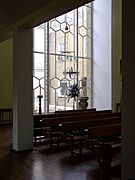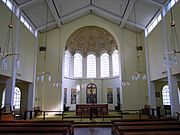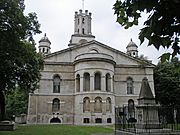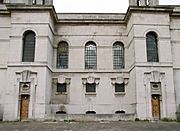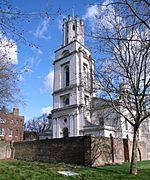St George in the East facts for kids
Quick facts for kids St George in the East |
|
|---|---|
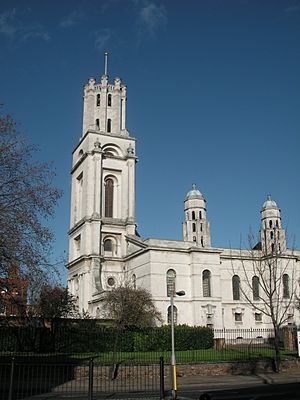
St George in the East seen from the south
|
|
| 51°30′36″N 0°03′35″W / 51.5100°N 0.0598°W | |
| Location | Cannon Street Road, London, E1 |
| Country | United Kingdom |
| Denomination | Church of England |
| Churchmanship | Anglo-Catholic |
| History | |
| Dedication | Saint George |
| Architecture | |
| Heritage designation | Grade I |
| Architect(s) | Nicholas Hawksmoor |
| Style | Classical (with Palladian and Byzantine elements) |
| Years built | 1714–1729 |
| Administration | |
| Parish | St George in the East |
| Diocese | London |
| Division | Stepney Episcopal Area (Archdeaconry of Hackney) |
St George-in-the-East is an Anglican Church located in the East End of London. It is found on Cannon Street Road, between The Highway and Cable Street. The church is named after Saint George. Behind the church, you can find St George's Gardens, which used to be the church's graveyard.
Contents
History of St George-in-the-East
Building the Church
St George-in-the-East is one of six churches in London designed by a famous architect named Nicholas Hawksmoor. It was built between 1714 and 1729. The money for its construction came from a special law passed in 1711, which aimed to build fifty new churches. The church's name is also used for the area around it, called a parish. In 1950, the church was given a special status as a Grade I listed building. This means it is a very important historical building.
Times of Trouble
In the 1850s, there were some disagreements within the church. The Bishop of London appointed a new lecturer, but this did not match the views of the church's leader and its members. This led to a period of conflict and disruption during services. Because of these problems, the church had to close for a short time in 1859. The church's leader, who was not well, then handed over his duties to someone else.
World War II Damage and Rebuilding
During The Blitz, a time when London was heavily bombed in World War II, St George-in-the-East was hit by a bomb in May 1941. The inside of the church was completely destroyed by fire. However, the strong outer walls and its unique "pepper-pot" towers remained standing.
After the war, the church was rebuilt. In 1964, a new, modern church interior was built inside the old walls. New apartments were also created under each of the corner towers. At this time, a new set of eight bells was made at the Whitechapel Bell Foundry and placed in the church.
Community Work Today
Since May 2015, St George-in-the-East has been working with the Centre for Theology and Community (CTC). This is a charity that has its offices in the church's East Crypt, which is an underground room. Priests who work for CTC now help lead the church services. The second floor of the church is home to the Community of St George. This is a group of Christian volunteers who help with the church's worship and its work in the community.
Gallery
See also
- List of churches and cathedrals of London
- Stepney Historical Trust
- All Saints' Church, Pontefract - another church where a modern building was constructed inside old ruins
 | Isaac Myers |
 | D. Hamilton Jackson |
 | A. Philip Randolph |


